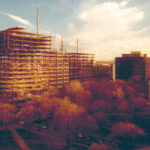 We need water to survive. That’s one thing that all of us humans have in common.
We need water to survive. That’s one thing that all of us humans have in common.
Here’s something else we have in common. Nearly all of us can enhance water quality in the greater Harrisburg region by planting a tree.
This summer, that’s the message coming from numerous local environmental groups, such as the PA Parks & Forests Foundation, in addition to government agencies.
An Imperative
A few hundred years ago, no less an authority than Thomas Jefferson extolled the value of trees. The nation’s third president equated killing a tree with capital punishment, saying, “The unnecessary felling of a tree, perhaps the growth of centuries, seems to me a crime little short of murder, (and) it pains me to an unspeakable degree.”
Nowadays, killing a tree probably won’t get you charged with a crime. Perhaps it should, when one considers all the ways trees contribute to water quality.
In case of rain or flooding, trees slow down and reduce the amount of water flowing into a stream or other drinking water source like a creek or river, said Marci Mowery, president of the statewide Parks & Forests Foundation, based in Camp Hill.
Trees do this in a variety of ways, such as capturing rain before it ever hits the ground.
“If you have ever walked down the street on a rainy day, you notice that it is probably safe to stand under the tree,” Mowery said.
Then tree roots absorb rainwater that makes it to the ground.
“An incredible amount of water goes up into a mature tree,” Mowery said. “So, that water is not directly flowing into the waterway from a flooding perspective.”
In addition, trees provide soil stability that prevents erosion. Rainwater trickles down and percolates into the soil and into the groundwater. The water is cleansed and impurities are removed as part of this process.
Without trees and tree cover, rainwater falls on impervious surfaces like blacktop, picking up chemicals on its way to a water source, such as our creeks and rivers and, ultimately, the Chesapeake Bay.
Tree cover also reduces temperature.
“Downtown areas often heat up much more quickly” due to the amount of asphalt and lack of tree cover, said Matthew Keefer with the Bureau of Forestry of the Pennsylvania Department of Conservation and Natural Resources.
Without tree cover, stormwater runoff that heats up can harm ecosystems that depend upon cooler water, especially in streams like the Conodoguinet and Yellow Breeches that are heavily sourced by coldwater springs, said Andrew Gavin, vice president of the Susquehanna River Basin Commission.
“Those warmer temperatures running off from parking lots and roads can really impact the aquatic ecosystem to the extent they are used to colder water temperatures,” Gavin said.
Ultimately, there are economic consequences, as well. Pennsylvania has 83,260 miles of recreational stream—second only to Alaska in the United States, Mowery said.
“We are a very large tourism state. Nobody wants to recreate if the water is bad,” she added. “We have a large craft beverage industry that depends on clean water. We have a lot of food production companies that depend on clean water. So, it is imperative that we protect this natural asset.”
Positive Aspects
Each year, Pennsylvania loses tree cover to development, whether residential or commercial, Keefer said. At the same time, “we gain forest back from agricultural fields reverting back to woods, so statewide the numbers are consistent.”
The greater Harrisburg area is probably losing more forest cover than gaining, due to the amount of development taking place, Keefer said.
“When you drive on 322 just north of the city (Harrisburg), and you look to the west, you can see new housing developments on top of the ridge, on top of the mountain,” he said. “So, there is certainly development like that happening.”
But Keefer is encouraged by the partnerships and restoration efforts he sees throughout the midstate. He cited examples like Penn State, which is working with school districts to plant trees on land owned by the districts, and Harrisburg, which has an arborist on staff leading efforts to increase tree cover and tree plantings citywide.
The greater Harrisburg area also has many volunteer-based organizations working to establish riparian buffers—tree plantings and tree cover along streams and waterways.
Among the more active is the Conodoguinet Creek Watershed Association.
The association partners with local municipalities and with the Chesapeake Bay Foundation’s “Keystone 10 Million Tree” project, which aims to plant 10 million trees throughout Pennsylvania by 2025.
CCWA volunteers have done tree plantings in Ridley Park and Acri Meadow Park in East Pennsboro Township, in Siebert Park in Camp Hill, and in Willow Mill Park and in the DiFilippo Nature Preserve in Silver Spring Township.
The association planted over 1,500 trees in 2021, not including the stormwater basin in East Pennsboro Township, where the association planted thousands of wildflowers and perennials.
In addition, midstate municipalities, including Hampden, Derry, Lower Allen and Londonderry townships, are exercising their authority under state law to levy fees upon businesses and residences to help pay for stormwater system improvements that protect and enhance water quality.
“A lot of municipalities are embracing the fact that it helps to build quality of life for their residents,” Gavin said. “You start to improve the local stream water quality and you improve aesthetics through more green space and connected parks. There’s a lot of rails to trails, and all that goes hand in hand with greening up a municipality. A big component of that is tree planting. All that contributes to a lot of things—a lot more positive aspects to residents, but it improves water quality, too.”
For more information:
The PA Parks & Forests Foundation, www.paparksandforests.org
Susquehanna River Basin Commission, www.srbc.net
Conodoguinet Creek Watershed Association, www.conocreek.org
Stories on environmental topics are proudly sponsored by LCSWMA.
If you like what we do, please support our work. Become a Friend of TheBurg!





